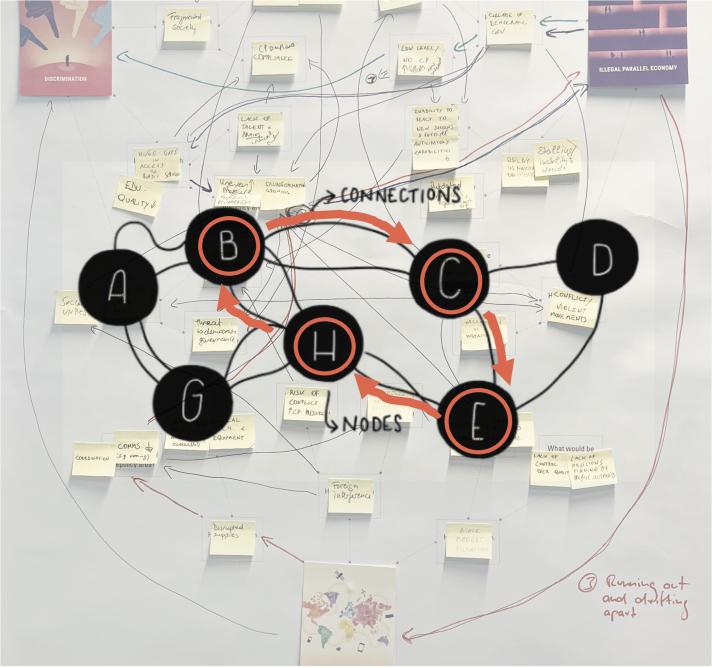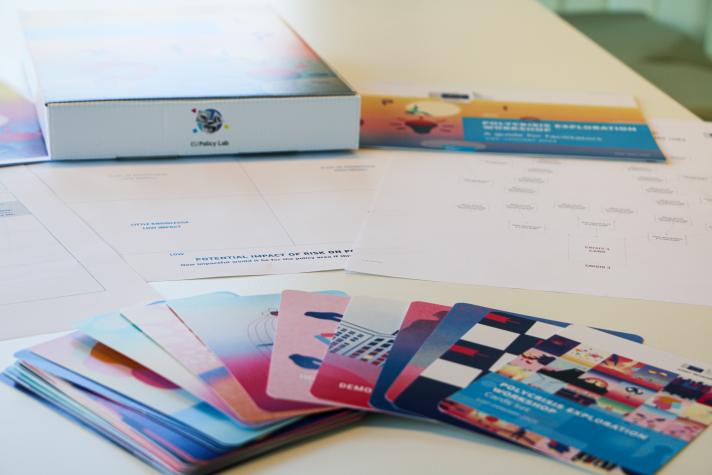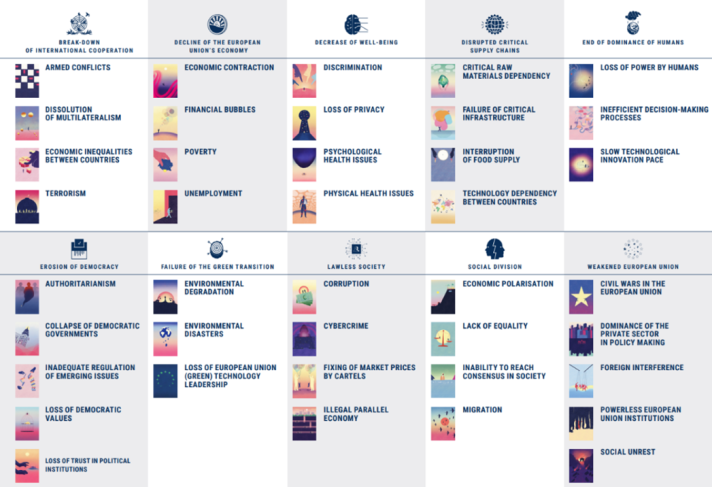
Crises rarely happen in isolation – in our increasingly interconnected and fragile world, one crisis can easily have cascading effects across various domains. Think of the escalating climate crisis, conflicts reshaping geopolitics, a global race for resources, economic corruption...and welcome to the era of polycrisis.
Polycrisis: refers to a complex and interconnected set of crises occurring simultaneously, often amplifying and influencing one another (also known as causal loops).
So, what can decision makers do today to make their policies resilient enough for an increasingly uncertain tomorrow?
The EU Policy Lab is proud to unveil our new Polycrisis Exploration Tool, emerging from the insights of the Risks on the Horizon report report. Developed by bringing together expertise from our foresight and design teams, the tool was designed to make foresight actionable and develop a holistic approach to risk management.
What does the tool bring to the table?
Unlike traditional risk assessments, which often focus on assessing isolated threats one by one, the Polycrisis Exploration Tool uses participatory methods to explore risk interconnections. By providing a systemic understanding of these interlinked developments, the tool serves many purposes and is applicable to practically any policy area. One very topical application is that the tool can help policymakers enhance Europe’s preparedness for complex challenges.
For the foresight experts out there, our tool is grounded in the Manoa methodology developed by Wendy Schultz. It revolves around exploring multiple futures wheels each starting with a weak signal to examine how interconnected risks might simultaneously materialise.
Our approach diverges from the conventional STEEP (Socio-cultural, Technological, Economic, Environmental, and Political) framework. Instead, we encourage participants to explore first-order developments triggered by a risk and subsequently delve into second-order developments to uncover interconnections across futures wheels. Participants get to select some of the most intriguing interlinkages they uncover for deeper analysis.
How does the tool work?
Our structured approach to foresight consists of bringing together a group of decision makers for a half day workshop which unfolds in the following way:
- First, we enhance risk awareness. Participants delve into a diverse array of risks, challenging conventional thinking and exploring beyond the standard ‘top 10’ lists of risks. Participants rank the selected risks, moving away from the most obvious ones and select the three risks that are perceived as having high impact, but which are relatively unknown to them in relation to their policy area.
- Then we map the polycrisis. Participants imagine and chart the trajectory of selected risks as they evolve into full-blown crises. The exercise focuses on how these risks are interconnected, revealing complex relationships and identifying critical areas for further investigation.
- Finally, participants identify policy interventions. By dissecting the root causes of crises, decision makers can brainstorm potential policy responses. This stage of the workshop encourages the creation of innovative interventions, looking for leverage points and partnerships aimed at mitigating negative impacts.
Flexible, forward-looking and innovative
A standout feature of the Polycrisis Exploration Workshop tool is its adaptability. Drawing on the 40 risks identified by the Risks on the Horizon foresight study, the tool is designed to be flexible, allowing facilitators to tailor it to the specific goals of participants. The workshop can be shortened or extended, depending on the available time. There is even the possibility to introduce ‘new’ risks – unexpected challenges which may be missing from the set of risk cards provided.
No two Polycrisis Exploration workshops are the same, as foresight depends on collective intelligence, the insights and expertise of the people in the room, thus fostering creative collaboration and problem solving. With this participatory approach in mind, the tool not only broadens risk awareness, but also sparks innovative solutions informed by diverse perspectives.
A half-day workshop will not produce a comprehensive strategy, but we encourage policymakers, organisations and even businesses to use it as the first step towards deeper analysis and long-term planning, resulting in strategic decision-making and better preparedness.
Download the tool here: Polycrisis Exploration Workshop
Revisit the Risks on the Horizon report
Reach out to the team who can help you set up your own workshop and adapt it to your organisation’s needs: JRC-EU-Policy-Lab
ec [dot] europa [dot] eu (JRC-EU-Policy-Lab[at]ec[dot]europa[dot]eu)
How did we come up with the 40 risks?
The 40 risks cards in the tool were identified in our Risks on the Horizon foresight study using a combination of one short- and one long-term weak signal from our Horizon Scanning activities. We developed a short newspaper headline and a story on how the two signals would evolve and we then explored their combined development through a futures wheel, involving many people - experts and non-experts alike - to harness the power of collective intelligence and select the far reaching 40 risks. These range from better known ones such as terrorism, cybercrime and loss of privacy to more surprising risks such as the loss of power by humans, inability to form consensus in society or inadequate regulation for emerging issues. Below you can see a snapshot with all the 40 risks.
Foresight for EU Preparedness
The Polycrisis Exploration tool aligns with the EU Preparedness Union's mission, promoting foresight as a vital instrument for long-term preparedness. Although foresight doesn't predict the future, it enhances awareness and readiness, paving the way for a more desirable tomorrow. Finally, in preparation for the release of the 2025 Strategic Foresight Report, the emphasis on anticipatory thinking will ensure that EU policies remain robust and adaptable in the face of evolving challenges.
Stay tuned for more updates!
Details
- Publication date
- 26 March 2025
- Author
- Joint Research Centre
- Department
- Directorate-General for European Civil Protection and Humanitarian Aid Operations (ECHO)
- EU Policy Lab tags







